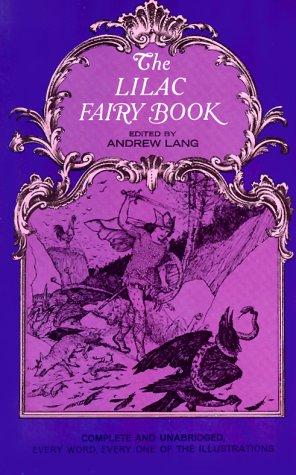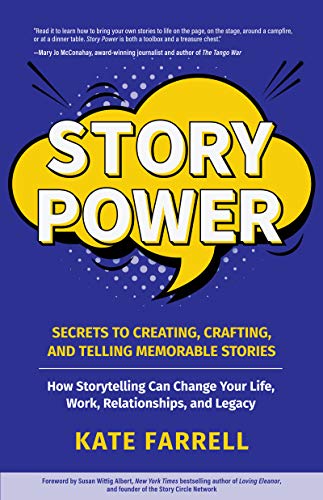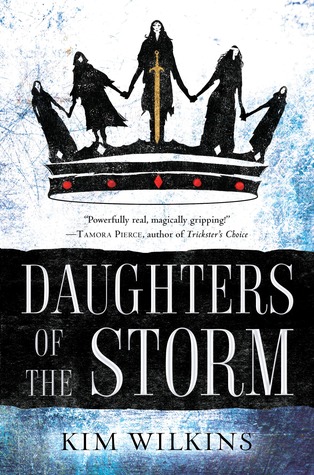In the preface to his 1910 collection of world folklore and fairy stories, Andrew Lang very firmly insists that he did not write any of them. Most of them, he says, were not really written but came from traditional storytelling in many cultures. To the extent that someone had to write them down, most of the tales in this book were translated and edited not by Lang himself, but by his wife. Yet together with the illustrations of H. J. Ford, these stories are part of the reason Andrew Lang is remembered as a great transmitter of stories from the magic world.
There are 33 stories in this book, drawn from the firesides of Wales, Ireland, Portugal, France, Africa, India, Finland, and beyond. Here is a bit of each story to whet your appetite:
The Shifty Lad is an Irish rogue whose ambition is to be a master thief, though his mother warns him: Your end will be hanging at the bridge of Dublin.
The False Prince and the True tells of an amazing reversal of fortune, set in motion when a youth gives a spoiled prince a box on the ears. The youth is offered a chance to save his life, but at a staggering price: Marry you? exclaimed he, butbutI am not yet twenty, and youwhy you must be a hundred at least!
The Jogis Punishment pits the deadly spite of a false holy man against the virtue of a beautiful princess. She is not really your daughter, who was stolen away at her birth, but an evil spirit that has takenher form, he said solemnly…
The Heart of a Monkey is at stake in a battle of wits between a shark and a monkey, which ends with a story within a story about a donkey, a lion, and a hare. This builds up to the monkeys famous taunt: So you think I am a washermans donkey?
The Fairy Nurse is a spooky Irish tale, told as if in a superstitious whisper (not to mention a Gaelic accent), about what a husband must do to rescue his wife from the good folk. I see your wife, says she, riding on the outside just so as to rub against us. Well walk on quietly, as if we suspected nothing, and when we are passing Ill give you a shove. If you dont do your duty then, woe be with you!
A Lost Paradise is a French version of the universal story of how a man and a woman, who have everything their hearts could desire, lose it all because of their burning curiosity about the one thing denied to them. Dont you ever wonder what is in that soup-tureen?
From the Finnish fairy tales of Topelius we learn How Brave Walter Hunted Wolves, a nostalgic return to childhood in which we are reminded that It is only cowards who boast; a really brave man never talks of his bravery.
The King of the Waterfalls is another story that supports Robbies transfigured heart theory of why Voldemort is so hard to kill. This adventure begins with a sporting young king who takes it into his head to play a game (which I understand to mean, wrestle) with a local fairy, and ends with a quest to destroy the soul of a wicked giant. Have a care, answered the queen, for it is not with a smile as on the other days that he will greet you…
A French Puck is a shape-changing, prank-playing spirit, similar to the title character in Susan Coopers The Boggart. This tale contains two of the French Pucks delightful tricks, after which a mysterious voice can be heard to say: Oh, dear! What fun I have had, to be sure!
The Three Crowns belong to a princess, whose prince must bring them to her before they can be marriedto say nothing of her sisters and his brothers, who have to delay their weddings due to a seven-inch-tall mans enchantment. And now Ill bid you farewell. Continue as good and kind as you always were; love your wife; and thats all the advice Ill give you.
The Story of a Very Bad Boy is similar to The Cunning Shoemaker of The Pink Fairy Book, in which a clever rogue overthrows the evil plans of three stronger and richer men. Look! I am sure I felt her body move! And now her nostrils are twitching. Ah! the whistle has not lost its power after all…
The Brown Bear of Norway, actually an Irish story, is about a princess whose husband is condemned to be a bear by day and a man by night. This is only the beginning of their troubles, which leads the young woman to sing, Four long years I was married to thee; Three sweet babes I bore to thee; Brown Bear of Norway, turn to me.
Little Lasse has an adventure in the Land of Nod, in which he sails around the world in a pea-shell boat and learns, like Dorothy Gale, that theres no place like home. Perhaps we should sail back to Polynesia now? said the happy dream-boy. No; they are frying pancakes in Europe just now, said Little Lasse…
Moti is the outrageous story of a great, strong, clumsy youth who, by one fortunate accident after another, becomes a kings favorite and a great hero. Oh, sire! panted the messenger, fly at once, there is no time to lose. Foremost of the enemy rides a mad giant at a furious gallop. He flourishes a tree for a club and is wild with anger…
The Enchanted Deer is a very strange story in which a fishers son trades his horse for a dog, a falcon, and a gun; then saves a princess from an enchantment, but must still go through many travels and perils to marry her. A sad look came on her face, as she saw it was no use, and at last she gave it up, and lifting his arm, wrote her name across his side…
A Fish Story is the Australian aboriginal story, not only of how the fish gave up hunting on land to live in the sea, but also of why you feel warm after dive into even the coolest of waters. Ask my father, Guddhu the cod, to light the fire. He is skilled in magic more than most fishes.
The Wonderful Tune is the story of a blind bagpiper named Maurice Connor (thats pronounced like Morris, if you care to know) who knows a tune that can set everything dead or alive dancing. In the eerie and gently sad conclusion of the story, Maurice goes to live under the sea with the Queen of the Fishes. Before taking leave of his mother, Maurice tells her, For a token of luck, and a sign that Im alive and well, Ill send you in, every twelvemonth on this day, a piece of burned wood to Trafraska.
The Rich Brother and the Poor Brother is a touching Portuguese tale about a man who is driven to the point of suicide by his misfortunes…only to find hope in the least expected quarter. It begins with a fathers awful words to his elder son: You are no son of mine; I have only one now. Begone, or it will be the worse for you, and as he spoke he lifted up his whip.
The One-Handed Girl, like the preceding story, illustrates the twin concepts that no good deed goes unpunished and that no honest suffering goes unrewarded. This time the victim of fate, ironically, is marked when she asks a blessing instead of property from her dying parents. Her brother, who chooses otherwise, is the one who really persecutes her. By the kindness of your heart have you been deceived, O king, said he. Your son has married a girl who has lost a hand. Do you know why she has lost it?
The Bones of Djulung concerns the youngest of seven sisters, whose devotion to a pet fish is rewarded long after the fishs bones have been buried in the ground. The maiden who can do such wonders is fitted to be the wife of the greatest chief…
The Sea Kings Gift is a Finnish story about a fisherman and his wife, and how the wifes constant longing for more and better things leads to a lesson in contentment. What better quote can I offer than, Every cow likes salt herring.
The Raspberry Worm features two girls who win the favor of the Raspberry King by sparing his life on the one day in a century when he must live in the form of a worm. Greetings to Otto from me, and tell him when I meet him again I shall do him the honour of eating him up.
The Stones of Plouhinec is a Breton story featuring an evil wizard, a pious farmhand, a pretty farmers daughter, and a row of standing stones that go down to the river to drink at midnight on the turn of every century. I especially like this bit: It was the stone on which Bernèz had carved the cross, and it was now a baptized stone, and had power to save him.
The Castle of Kerglas is yet another story showcasing the surprising cleverness of a poor idiot. Peronnik, in spite of his vacant expression and lack of sophistication, manages what many great knights failed to do. You only begin to doubt that he is really such an idiot when he tells the giant that he brings him the apple of delight and the woman of submission. If you eat the apple you will not desire anything else, and if you take the woman as your servant you will never wish for another. These statements are quite true…but not the way the giant understand them!
The Battle of the Birds is only the beginning of a tale involving a king who has promised his firstborn son to a giant, and the prince who must accomplish several impossible tasks to win the hand of the giants daughter.
The Lady of the Fountain is a Welsh Arthurian legend featuring Sir Owen and many other knights of the round table. Many men try to fight against the knight who guards the fountain, but who is that masked man anyway? I am persuaded, said the countess, that this man and no other chased the soul from the body of my lord.
The Four Gifts are a fairys way of repaying a hardworking farm girl for a favor. Strangely (unless you understand the way fairy minds work, I suppose), the girts turn out to be more of a curse than a blessing, is each onetime, money, wisdom, and beautytake Téphany not closer, but farther from marrying her true love. Here they are, all of them, she cried; they belong to you. Let me never see them again, but I have learned the lesson that they taught me….
The Groach of the Isle of Lok is the story of a young farm laborer who runs away to seek his fortune, so that he can marry his sweetheart. Thanks to three magical gifts (a bell, a stick, and a knife) his sweetheart is able to rescue him from an evil fairy. The swallow is less swift than the wind, the wind is less swift than the lightning. But you, my horse, if you love me, must be swifter than them all, for there is a part of my heart that suffersthe best part of my heart that is in danger.
The Escape of the Mouse is a weird Welsh tale about a landlord whose tenants, crops, friend, and wife disappear, and who is driven from place to place by a series of misfortunes. It isnt until Manawyddan takes it into his head to hang a mouse for stealing, that the true cause of his problems comes out. But not yet will I loose the mouse till I know who she is. She is my wife, answered the bishop.
The Believing Husbands is a variant of a story called The Six Sillies in The Red Fairy Book, combined with The Merry Wives in The Pink Fairy Book. A man offers a prize to whichever of three women can prove her husband to be the greatest fool. You are not my husband! Oh, am I not? asked he. No, it is not you, answered she, so he went away and slept in the wood.
The Hoodie-Crow is yet another prince who is cursed to take the form of a beast half the time, and whose wife must cross a tangle of poisoned thorns to be reunited with him. Indeed I will wed thee; a pretty creature is the hoodie…
The Brownie of the Lake is a somewhat tragic story about a farmhand who obtains a brownies help to win the hand of the farmers daughter, only to regret it bitterly afterward. Ah! my little brownie, if you can do that, there is nothing I wont give you, except my soul.
The Winning of Olwen, to to be confused with Owen, is another Welsh Arthurian legend, featuring a prince named Kilwch (you figure out how to pronounce that!) and a series of impossible tasks. Unfortunately, like The Story of Sigurd in The Red Fairy Book, the Langs condensed this story a bit too much, so that you find yourself wishing it went on into more detail.
But if that is the margin by which this book falls short of perfection, it is a very good book indeed! It is a must-read for fairy-tale lovers and for parents of that special kind of child who requires a bedtime story to send him off to the Land of Nod.




